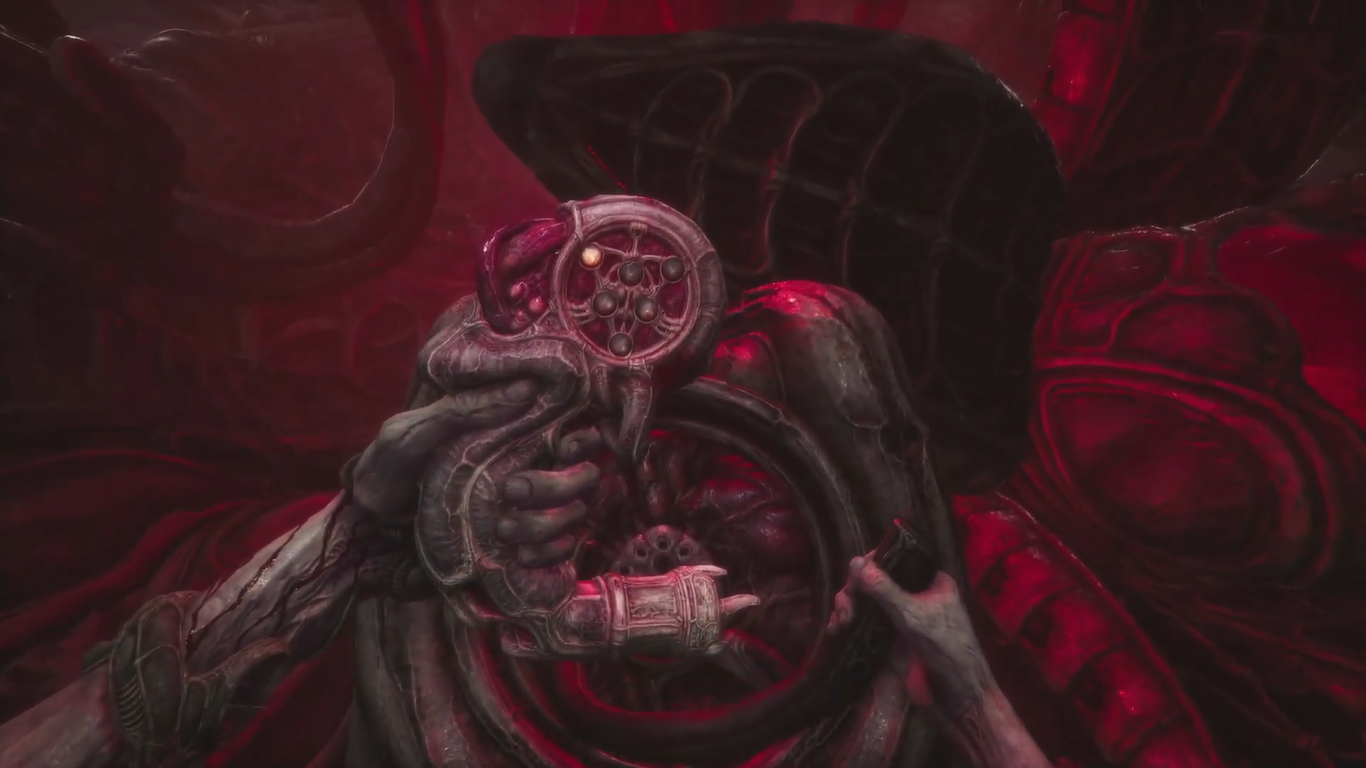Scorn
Blake Reno, Contributing Editor
In gaming, the horror genre induces a sense of the uncanny in its player. In Freudian terms, the uncanny is a familiar experience in an eerie or even taboo context. What one experiences in a horror game is a relative approximation to your own life: the need to avoid injury and the movement towards a solution to problems. However, the most powerful horror games are those where the relationship between the real world and the game world get pulled apart. Scorn does this masterfully, forcing the player to adapt to a world with its own logic that is almost too real by upsetting the genre conventions of video games.
Ebb Software doesn’t let you forget that not only is the player-character biological, but the world is too. This isn’t merely an aesthetic choice; it forces the player to realize that the world of Scorn is as alive as you are, though it’s not governed by the same. This is in alignment with the philosophical concept of Dasein (see Martin Heidegger’s Being and Time), which translates from German to “being-there” but is more appropriately thought of as existence in the world. Ebb Software mentioned this concept as an inspiration for the game and have made good on this philosophical speculation. Scorn forces the player to reconcile their general understanding of video games with the peculiar realities of this video game.
This connects with the spare gameplay and UI in Scorn. You aren’t given instructions, at least not in the usual tutorializing manner. The game introduces the player to its world through a puzzle after a short hallway in which you get used to moving through the game’s world. Of course, the twist is that this puzzle involves dismantling another being like yourself, one that’s trapped in a fleshy prison and makes sounds of pain as you free them from their circumstances. This ultimately results in freeing them, half-formed, from their prison and forcing them into a machine to unlock a door, or depending on the choice you make, killing them and taking their severed arm to unlock that same door. Which choice is “good” or “bad” isn’t obvious: both routes lead to great pain for a nameless being, one ends in death. Making matters worse, you don’t know your ultimate goal in Scorn. You can only make assumptions based on your knowledge of other games.
And this is where Scorn is at its best in creating horror. The game already provoked a sense of body horror and lack of control with the game’s first puzzle, but as you acquire your first weapon, you begin to understand that the game doesn’t operate like other examples of digital horror. The first “gun” is a glorified punch that runs on steam and takes a while to load. This makes combat extremely difficult against “enemies” with ranged attacks. I put “enemies” in quotes as typically the understanding is that anything that moves and attempts to damage you is an “enemy”. However, most of the game’s combat is optional. Yes, “enemies” do have a trigger for when to appear depending on player position, but if you just stay out of their way, they’ll simply disappear into the fleshy walls of Scorn’s world. But because you’re given a weapon/gun, the conditioning done to the player by other games suggests that you make your way in the world through combat, with all the violence that entails.
The relationship between the player’s experience with other games and what Scorn asks of the player creates much of the tension of Scorn. One of the guns you obtain shortly before being beset upon by hostile enemies that will chase you doesn’t come pre-loaded like new guns in other games. I assumed that Scorn was like other games, but it was in this moment that I realized Scorn operates purely on its own logic and I “got it”. It was here that I realized that the world of Scorn is alive, knows what the player is expecting and responds accordingly. The uncanny power of Scorn lies in its ability to take advantage of what it expects you to expect, creating moments in tension with first-person shooter genre conventions. Had I not even picked up that gun, I wouldn’t have actually needed it. Only the first and last weapons are necessary to complete the game, the first also serves as a tool to interact with certain objects and the last one is necessary to solve some puzzles (but the game forces you to take it, so you cannot miss it).
In many respects, Scorn is the most punishing conception of a “game” imaginable. The horrors of the game are wrought from your own experiences in gaming. It has so many rules that a player has to adapt to in order to make their way safely in the world. It is such a tremendously divisive game because it is so uncanny, resembling other first-person games while demanding to be played a different way. The major criticism of the game from reviewers has targeted its combat, but the combat is only necessary if you stick to your knowledge of videogame genre conventions instead of approaching Scorn on its own terms. The horror of Scorn lies in the helpless feelings it creates in the player as they try to understand its world using their knowledge of other games. Instead of fighting against the living, breathing world of Scorn, the player should realize they are only a part of the world, not its master.






